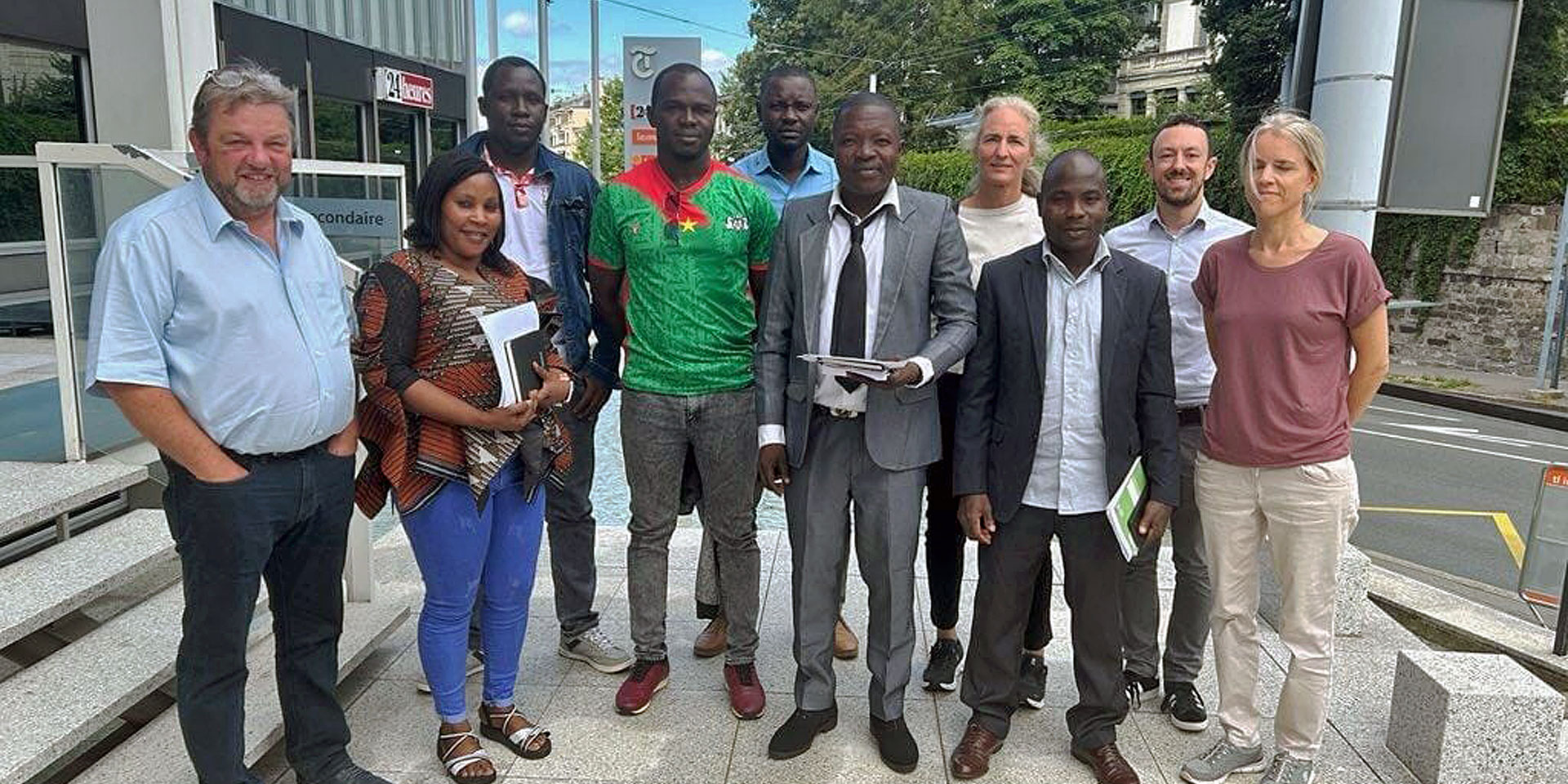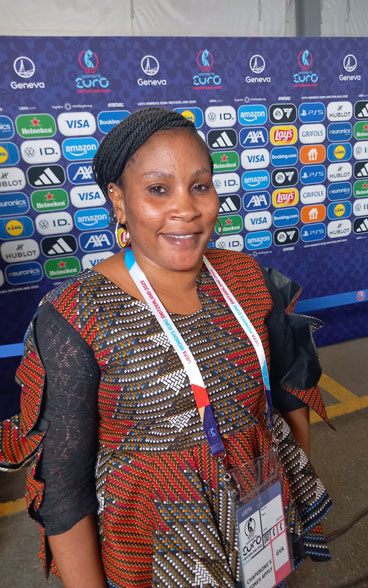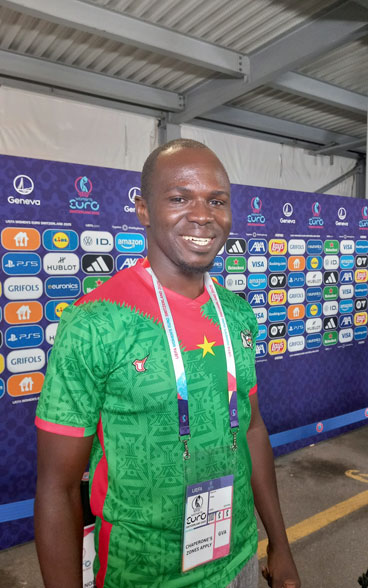Sport as the universal language of change and cohesion
Women's EURO 2025 – providing a platform: both sport and the media play a crucial role in bringing about social change. Six journalists from the Sahel region gain insights into international sports and human rights institutions during their visit to Switzerland. The project was organised by FDFA special envoy for the Sahel Cédrine Beney, the FDFA's Peace and Human Rights Division and Fondation Hirondelle. Two of the participants give their impressions.

Six journalists from the Sahel region gain insights into international sports and human rights institutions during their visit to Switzerland. © Fondation Hirondelle
Sport is a universal language that brings people together. It transcends social, cultural and political barriers, promotes social cohesion and creates opportunities for civic engagement. In regions with fragile political structures, like the Sahel, creating spaces where communities can get involved is key to fostering social inclusion and strengthening national cohesion.
Football and the media fostering dialogue
Sport, including football, is not just a leisure activity but a catalyst for peace. Football builds bridges between communities, delivers a message of equality and, in particular, gender equality, and provides a safe space for many young people across the Sahel facing security-related, economic and institutional challenges.
Football makes a significant contribution to peace by promoting equality, social inclusion and national cohesion. However, media coverage of sport also has a social impact, with sports journalists actively helping to bring about social change. Coverage of events and the values fostered by sport, such as justice and equality, highlight social dynamics and strengthen public dialogue. The Women's EURO 2025 is a key platform highlighting the interrelationship between sport, human rights and gender equality.
Women's Africa Cup of Nations (WAFCON 2025), Morocco
While the Women's EURO 2025 is under way in Switzerland, people in Africa are focusing on the 15th edition of the biennial WAFCON, which is being hosted by five cities in Morocco. The delayed WAFCON 2024 is taking place between 5 and 26 July 2025, with 12 national teams taking part, including Mali representing the West African Sahel region. The tournament is organised by the Confederation of African Football (CAF), which, like UEFA, is one of six member associations of global governing football body FIFA.
Sport as a tool for editors and educators

Fondation Hirondelle (Media for Peace and Human Dignity), which is a not-for-profit organisation based in Lausanne, approaches sport strategically as an editorial and educational tool and regularly includes sports events in its media work. It works to ensure that people living in areas affected by crises and conflicts, especially in French-speaking African countries, have access to reliable, local, independent information by supporting radio stations, training journalists, developing editorial guidelines, and providing funding for equipment. In 2023, Fondation Hirondelle's programmes reached some 10 million people around the world.

Many journalists from the Sahel region have little or no access to international sports bodies. That is why Fondation Hirondelle, supported by the FDFA's Peace and Human Rights Division, arranged for six journalists from the Sahel region to visit Switzerland during the Women's EURO 2025. The trip to Switzerland – a global hub for sport and human rights – is a valuable opportunity for the journalists to gain insights into global sports governance, explore ethical standards and regulatory mechanisms, and have direct contact with key stakeholders in the world of international sport.
We were interested to hear how important football is in the journalists' home countries and what impressions and insights they will take away from their stay in Switzerland.
What social significance does football have?
Salamatou KADRI, sports journalist at Studio Kalangou in Niger:
In Niger, sport in general, and football in particular, play a very important social role. As the most popular sport alongside traditional wrestling, football is a unique channel for conveying important messages and tackling youth unemployment, violent extremism, stereotypes, poverty and gender discrimination. Football is a factor of cohesion, helping to reduce growing inequalities and empower women and young people. It also strengthens social ties within Nigerien communities. For a vast country twice the size of France, all this is of paramount importance in influencing the country's socio-economic policy.
Martin KABA, sports journalist at Studio Yafa in Burkina Faso:
In Burkina Faso, football plays a key role in social cohesion. Since the Étalons' achievement at the 2013 Africa Cup of Nations, it has brought together different sections of society, transcending political divisions. Today, it brings together internally displaced persons and host communities, and its impact can even be felt in a reduction in violence during major competitions. No study has yet been able to explain the reasons for this decline in activity during these periods, but this fact shows the importance of football even in times of crisis. It also contributes to gender equality, promoting empowerment and breaking down stereotypes. Today, for example, parents encourage both boys and girls to participate in sports after school. In short, football is a factor in cohesion, coexistence and peace, and an important tool, leisure activity and sport for breaking down social barriers and outdated views.
What impressions and insights from your stay in Switzerland will you take away with you?
Salamatou KADRI:
My stay in Switzerland was wonderful. I learned a lot about sport and human rights in sport. I would like to thank the Foundation Hirondelle and the FDFA for this great initiative.
Martin KABA:
This trip has helped me understand that the challenges facing women's football are virtually the same in Burkina Faso as they are here in Switzerland. It is a sport that is growing rapidly, but there are still many barriers to overcome. However, I have noticed significant progress in both countries. The Women's Euro is a great opportunity to build on this progress. The stadium filled with 26,535 fans during the semi-final between England and Italy gives us great hope for the future. Let's hope that this momentum continues in the days, months and years to come, both among the general public and among decision-makers. During our stay, we also had the opportunity to talk to the Centre for Sport and Human Rights, CIES, AIPS and others who are undertaking major initiatives in this area. This visit is a wonderful opportunity offered by the FDFA and the Hirondelle Foundation to discover other realities and everything that is being done to develop football and women's football in particular.
Independent, credible, inclusive, impartial information is needed to resolve crises and build peaceful societies, which helps to achieve SDG 16 'Peace, justice and strong institutions' under the 2030 Agenda. Since 2013, Fondation Hirondelle has been an institutional partner of the Swiss Agency for Development and Cooperation (SDC), helping it to implement and achieve SDG 16 and Article 19 of the Universal Declaration of Human Rights which recognises access to information as a universal right. Strengthening the rule of law by promoting independent media and public accountability is integral to Switzerland's foreign policy strategy.
